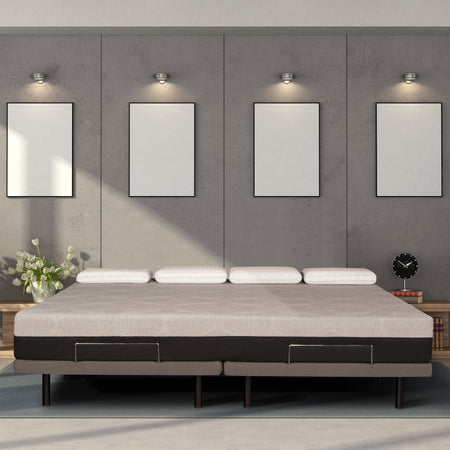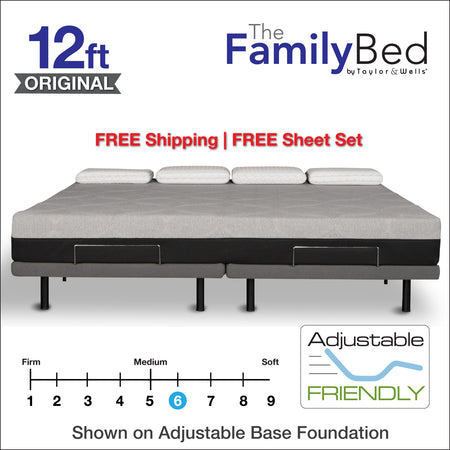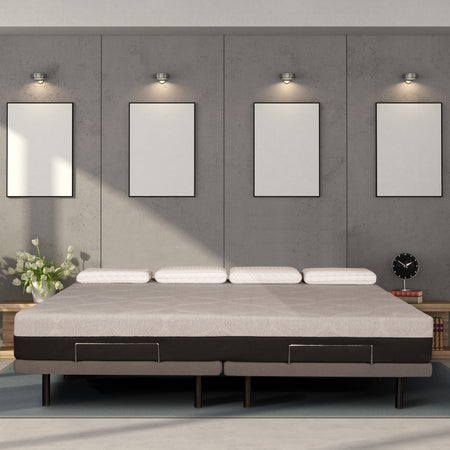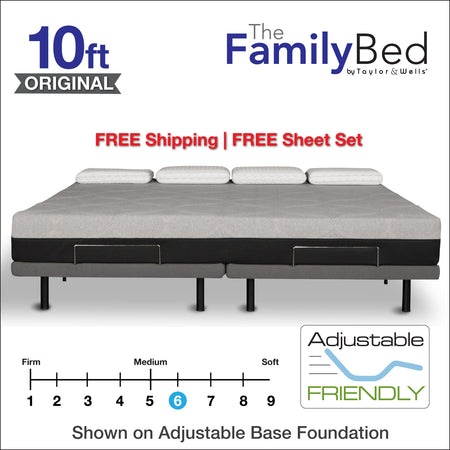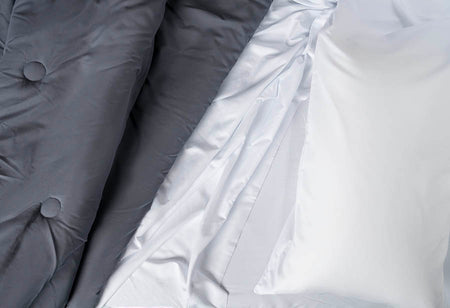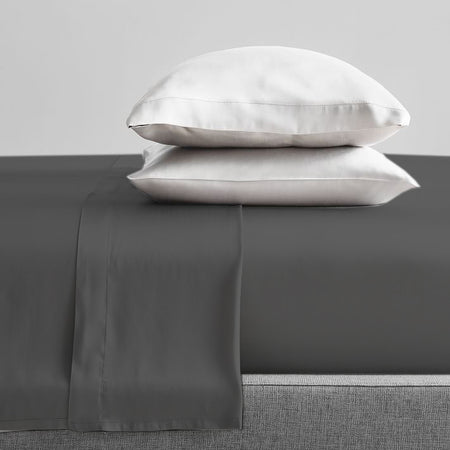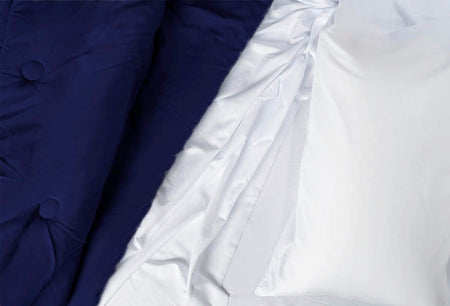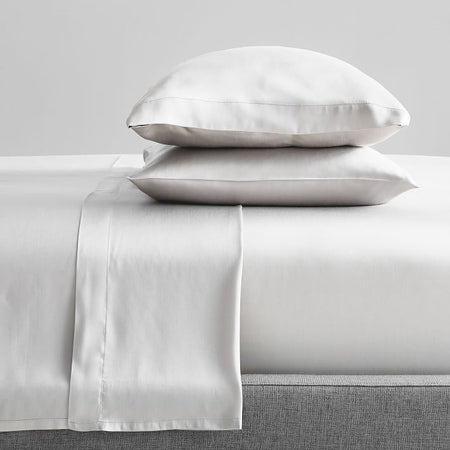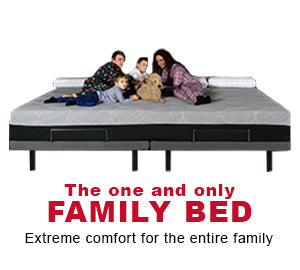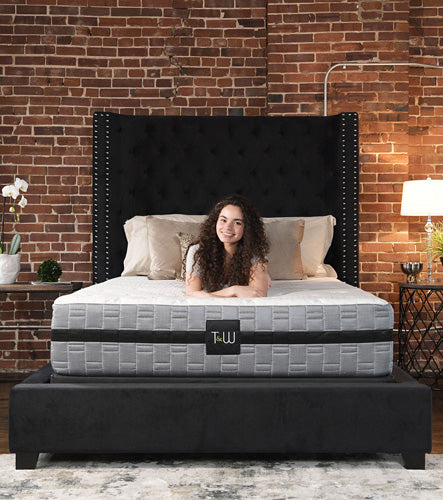A good night’s rest is essential for good health and well-being. It is just as vital as breathing, drinking, and having a balanced diet. While sleep needs vary from one person to another, most adults require between 7 and 9 hours each night. Yet about 1 in 3 adults in the US reported not getting enough sleep every day. Also, an estimated 50-70 million Americans have ongoing or chronic sleep disorders.
Sleep deprivation has been tied to numerous physical and emotional problems like impaired cognitive function, compromised immune system, cardiovascular diseases, depression, diabetes, obesity, etc. Many factors can affect sleep, but the most common and often overlooked one is the mattress.
A mattress can mean the difference between a refreshing night’s sleep and a constant struggle with fatigue and health problems like night sweats, and sleep apnea. Research, shows that sleeping on a medium-firm mattress, especially one with adjustable firmness, promotes proper spinal alignment, comfort, and quality sleep. Participants who slept on medium-firm memory foam mattress had a decrease in pain and fell asleep faster. In contrast, one survey found that 7% of sleep issues were linked to uncomfortable mattresses, leading to physical discomfort and poor-quality sleep.

The Importance of Sleep
Sleep is a basic human need, much like food and water. It's not simply a time for our bodies to rest, but a complex biological process that impacts everything from our mood and cognitive function to our immune system and even our risk of chronic diseases.
We cycle through various sleep stages, each with its restorative properties:
REM (Rapid Eye Movement) Sleep
The brain becomes remarkably active during REM. This stage is crucial for cognitive function and emotional well-being.
Key Restorative Functions
- Memory Consolidation: REM sleep is closely tied to memory consolidation, a process essential for learning and retaining information.
- Creativity Enhancement: Studies suggest that REM sleep fosters creativity and problem-solving skills, allowing the brain to form novel connections and insights.
Deep NREM Sleep
Deep NREM sleep is characterized by slow-wave sleep (SWS), and it plays a pivotal role in physical restoration and immune system support.
Key Restorative Functions
- Tissue Repair: This stage facilitates the repair and growth of tissues, including muscle and bone. It is a critical period for recovery from daily wear and tear.
- Immune System Strengthening: Deep NREM sleep is associated with the release of growth hormones, contributing to the strengthening of the immune system.
When the sleep cycle is disrupted, the brain struggles to progress through the necessary stages, depriving the essential benefits of REM and deep NREM sleep. Constant sleep disruption has been linked to impaired cognitive function, affecting memory, attention, and decision-making. Insufficient deep sleep also compromises the body's ability to repair tissues and strengthen the immune system, leaving individuals more susceptible to illnesses.

The Role of a Good Mattress in Mitigating Sleep Disruption
A comfortable mattress serves as a foundation for uninterrupted and restorative sleep. It's not just about comfort (although that's important too). A good mattress goes beyond a soft surface to provide the critical elements that foster sleep health.
Spinal Alignment
Proper spinal alignment is critical in ensuring a healthy sleep posture and preventing discomfort or pain in the back and neck. A good mattress conforms to the body’s curves and supports the spine's natural curvature. It also offers the proper firmness levels whether you sleep on your back, side, or stomach. In some cases, the mattress can provide zone support, with firmer areas cradling your hips and lumbar region softer areas accommodating your shoulders and head, further enhancing alignment.
When the spine is misaligned, you could end up experiencing:
- Back and neck pain: Improper support strains muscles, joints, and ligaments, resulting in aches and stiffness upon waking.
- Disrupted sleep patterns: Painful discomfort disrupts sleep cycles, leading to frequent tossing and turning, preventing deep sleep and its restorative benefits.
- Decreased sleep quality: Even if you manage to fall asleep, an unaligned spine can compromise the quality of your slumber, leaving you feeling groggy and unrefreshed.
Pressure Relief
Pressure points occur where your body weight concentrates, typically in the shoulders, hips, and knees. When these points endure excessive pressure for extended periods, it can lead to discomfort, joint pain, and sleep disturbances. A good mattress offers pressure relief to mitigate these effects, thanks to its construction that allows even weight distribution, targeted support, and motion isolation. As a result, it fosters a more supportive sleep environment, promoting uninterrupted rest and contributing to overall sleep quality and well-being.
Unwelcome pressure leads to issues like:
- Muscle tension and pain: Constant pressure restricts blood flow and strains muscles, leading to aches and stiffness upon waking.
- Restlessness and sleep fragmentation: The body's natural response to discomfort is to toss and turn, which breaks up sleep cycles and prevents deep, restorative sleep.
- Waking up unrefreshed: Even if you manage to drift off, the discomfort lingers, compromising the quality of your sleep and leaving you feeling groggy and unfocused throughout the day.
Sleep Hygiene
Sleep hygiene refers to a set of practices and environmental factors that promote quality sleep. It encompasses everything from the darkness of the room to the comfort of the mattress, aiming to create optimal conditions for restorative rest. A good mattress supports sleep hygiene by providing a comfortable, clean, and supportive sleep environment.
Consequences of poor sleep hygiene include:
- Respiratory issues: An unclean sleep environment can exacerbate respiratory issues, leading to problems like allergies and increased susceptibility to respiratory infections.
- Allergies and dust mites: A mattress that lacks allergen resistance can harbor dust mites, allergens, and dead skin, contributing to allergic reactions and discomfort during sleep.
- Discomfort and restlessness: An uncomfortable sleep environment, including an unsupportive mattress, can lead to discomfort and restlessness, disrupting sleep cycles and preventing deep, restorative rest.
- Compromised mental well-being: Poor sleep hygiene can contribute to stress, anxiety, and compromised mental well-being. The inability to create a conducive sleep environment affects the ability to unwind and relax, which is essential for a good night's sleep.
Signs Your Mattress Needs a Change:
Just like the rest of us, mattresses age. Over time, the supportive core weakens, plush layers flatten, and pressure points develop, turning your once-cozy haven into a sleep saboteur. But how do you know it's time to say goodbye?
- Your mattress shows visible indentations or sags in the middle
- You wake up with persistent back pain or stiffness that dissipates throughout the day
- Aches and pains in the hips, shoulders, or other joints
- Excessive noise, such as squeaking or creaking sounds when you move or shift on the mattress
- You feel every movement your partner makes, or if their movements wake you up at night
- You experience increased allergies or breathing problems
- Your mattress is nearing or has exceeded the 7 to 10-year timeframe
- You find yourself tossing and turning, experiencing more restless nights, or waking up frequently
- Deep and permanent indentations in the mattress surface
- Stubborn stains or persistent odors that don't respond to cleaning
- You've experienced significant weight changes
Investing in Your Sleep, Investing in Yourself
Choosing a new mattress may seem daunting, but remember, it's an investment in your health and well-being. Here are some steps to guide you:
- Consider your sleep preferences, body type, and any specific needs you might have. Do you sleep hot? Do you share your bed with a partner? Understanding your personal needs will help you narrow down your options.
- Not all mattresses are created equal. Explore different types (innerspring, memory foam, hybrid) and features (cooling technology, adjustable firmness) to find the best fit for your budget and priorities.
- Don't hesitate to seek guidance from sleep specialists or reputable mattress retailers like The Bedding Mart. We can answer your questions and help you find the perfect match.
Remember, sleep is not a luxury; it's a necessity. Understanding the connection will help create a sleep environment that fosters restful nights and a healthier, happier you. So, invest in your sleep, invest in a good mattress, and unlock the door to a world of well-being.


